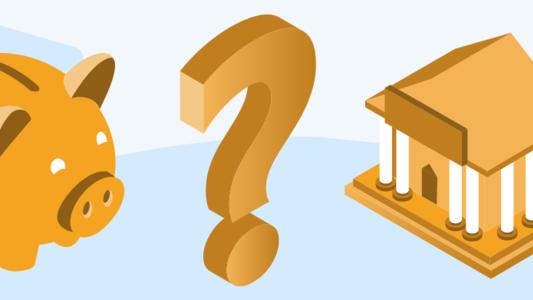How Much Do I Need for a Mortgage Deposit?

How much do I need for a mortgage deposit in 2022? With house prices continuing to be sky high, many people are concerned how they can afford their own home and the most common question is how much they might need for a mortgage deposit. In our guide, we go through what a mortgage deposit is and how much you might need!
What Is a Mortgage Deposit?

When buying a home, it’s very normal for people not to be able to afford the full up front cost of the property they want to live in. Banks and other financial institutions offer to help you out with this by giving you a mortgage, where you are lent the money and you pay it back over a long period of time.
One of the most important parts to getting a mortgage is putting down a deposit. A deposit - also called a down payment - is the upfront payment you will need to put down in order to take out your mortgage. The deposit usually covers for a small percentage of the total value of the property you want to buy.
Why Do I Need a Mortgage Deposit?
Mortgage lenders typically ask for a deposit in order to reduce their risk of the mortgage loan. In other words, they require the borrower to put up a bit of the money to make sure they are committed to paying off the loan over a long period of time. A higher deposit will also benefit the borrower in the long run since you will typically require a smaller loan and therefore it will work out cheaper.
What Is a Typical Mortgage Deposit?

Mortgage can come in all different shapes and sizes and there’s no unified or set amount that is typically expected when it comes to putting down your down payment. However, there are trends that banks and other mortgage lenders have typically followed as the UK housing market has twisted and changed.
Before the financial crisis in 2008, mortgage lenders were happy to lend on smaller 5% deposits. Since the crash, the lenders have become a lot more careful when it comes to offering terms, and it’s typical that you’ll only find mortgages for a 20% deposit.
High deposit requirements have increasingly made it difficult for people to get mortgages because it means they need to have much more money to get started.
Can I Get a Mortgage with No Deposit?
Since the financial crash, some mortgage lenders would lend 100% loan-to-value mortgages that wouldn’t require a deposit. At the moment this has been completely abandoned and almost all lenders will require a deposit.
What does loan-to-value mean? You might hear the term loan-to-value a lot when you’re looking into mortgages and it can sound a little confusing.
When you take out a mortgage, you will pay for a bit of your house with the deposit and the rest your lender will lend to you. The loan-to-value is simply how much your lender lends you to your house’s value. For example:
If the house price is £250,000 and your deposit is £25,000 (10%), your lender will lend you £225,000 (90%). This means the loan-to-value will be 90%.

How Can I Improve My Deposit Terms?
The terms of your deposit will usually affect how much you will pay and how long you will be able to get the mortgage for. As a general rule, the less deposit you put down, the higher the interest rate you’ll have to pay in the future since mortgage lenders will have to compensate themselves for giving you the loan.
Is It Better To Have a Higher Deposit?
If you can, it is generally better to save for a higher deposit. In the long run, paying more upfront for your home will ultimately make your repayments cheaper and the length of your mortgage shorter.
Here are some ways a higher deposit can benefit you:
- Lower risk
Since you would have already put down a higher amount, you reduce the risk of your house value falling below your mortgage’s worth. - Cheaper repayments
With a higher deposit, you won’t need to borrow as much as you would have done otherwise. This means the amount you pay back will be lower and so will your monthly repayments. This can leave you with more of a household budget to pay for other things. - Better interest rates
You can also have access to better interest terms with a higher deposit. This is because with a higher deposit you make the loan less risky for your mortgage lender so they are likely to reduce the amount you pay for this loan over time.
What About My Credit Score?
Another way of improving your mortgage terms is by boosting your credit score. Proving that you pay bills on time and you keep up with payments will give your mortgage lender more confidence that you can pay off the debt with them.
One of the best ways to improve your credit score is to use a credit card every so often each month. This will demonstrate to you mortgage lender that you are capable of paying off your debts each month and every month, but make sure you pay the bill in full and not only partially.

What Are Acceptable Deposit Sources?
There are many acceptable forms that your deposit can be in. No two mortgage lenders will ask for the same type of deposit and you might find that terms vary between them. The form that you get your deposit in can determine how easy it is for you to get a loan.
Here’s list of acceptable deposits:
- Personal Savings
Personal savings from either you putting money regularly into your bank account or earning money from an investment fund are usually the most acceptable form of deposit. You might find lenders asking for evidence of you paying into the savings account, but in general they will accept it. - Inheritance
As long as the inheritance has either already been paid or going to be, inheritance money is perfectly acceptable when putting down your down payment. - Sale of Property or Assets
Raising the money for a deposit through selling a property or any other assets is generally acceptable too as long as the proceeds have been both legitimate and are cleared into your bank account. - Gift
If you’ve been given your deposit as a gift, you may be able to use it as your deposit. However, some lenders might want the gift to be from a close family member and will not accept it otherwise.

Is There Help Available for My Deposit?
Naturally, many first-time home buyers are looking at the housing market in despair. With deposits and house prices so high, it seems that getting a mortgage is impossible. However, there is a lot of help available to people who are looking to get their first mortgage loan, and particularly when it comes to the deposit.
Help for First-Time Buyers
First-time buyers have access to different schemes that increase the affordability of mortgages. These include a number of government-backed programmes to help reduce the burden that an initial mortgage deposit usually incurs. As well as these, you also have help for those wanting to buy their council houses.
- 95% Mortgage Guarantee Scheme
- First Homes Scheme
- Right to Buy
- Help to Buy equity loans
- Stamp Duty Relief
Read more in our First-Time Buyer guide!
What If I Have Bad Credit?
If you have a bad or no credit score, it can be difficult to get favourable terms on your mortgage loan. You might have to turn to a specialist mortgage lender that can help you both with the deposit and advise you properly.






